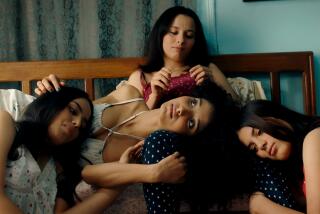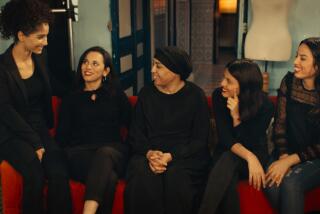Indie Focus: Ruba Nadda’s ‘Cairo Time’
- Share via
Writer-director Ruba Nadda’s languidly paced indie romance “ Cairo Time” centers on the relationship that develops between an American woman and an Egyptian man. But Nadda says it’s the city itself that captured her heart long ago — she first visited the capital with her family as a teenager and she was determined with this film, her second feature, to offer audiences a realistic depiction of the thrumming nature of life there.
“My No. 1 desire was to capture the real Cairo,” said Nadda, who was born in Canada to a Syrian father and Palestinian mother. “Any time you see a part of the Middle East on the big screen it’s always war-torn, so people have this misconception that the entire Middle East is always at war and they’re shocked by how beautiful Cairo is.”
Part romance, part travelogue, the film stars Patricia Clarkson as Juliette, who arrives in Cairo intending to see her diplomat husband (Tom McCamus). He is repeatedly delayed, however, and she spends more and more time with a former colleague of his, Tareq ( Alexander Siddig), who shows her around the city.
The two form a fast emotional bond, engaging in something that is not quite adultery but definitely an affair of the heart.
“She’s not a deeply unhappy woman,” Clarkson said of her character. “I don’t think she’s needy or hungry or really anything when she arrives, and that’s what I actually love in this story. It is about the serendipitous nature of suddenly having your heart split in two.”
The film was shot over 25 days and takes in not only such iconic locations as the pyramids and the Nile but also local coffeehouses and ancient bridges to bring the full flavor of the city to the screen.
“The thing is the city itself is so mad, it’s so chaotic,” said Nadda. “There’s like 20 million people in that city, so there’s going to be some ridiculous amounts of garbage, there’s going to be child poverty, there’s going to be a mule sharing the road with cars. For me, I wanted to put in all of that. It was important to me not to cover it up because it was a romance, whatever was in the frame was in the frame.”
Getting that sense of Cairo as an outsider would actually experience it proved to be a challenge on multiple levels. Strict permits were needed for all locations, and the city’s sheer density meant that streets could not be blocked off for filming. The production was assigned an official representative of the government censorship board who had to physically sign each can of exposed film after shooting.
It is easy to make assumptions about what the government representative might object to, but Nadda was surprised by what the censor’s actual concerns turned out to be.
“She could care less if I had a sex scene in the movie,” Nadda said. “Her concern was how I portrayed Egypt to a North American audience, and it was a very classist position. If I had people in the background who weren’t as well dressed as they should be, she would kick them out. She didn’t want me to photograph garbage or poverty. So we had all these little games we’d play, like my sister would take her shopping or for a coffee or to a different location.”
Despite the need for permits, Nadda would sometimes take a camera crew around the city to unofficially grab more footage, and three times she was nearly shut down by authorities. Each time she made sure the film was spirited away as she argued her case.
“I was like, ‘It’s one thing for us to be arrested, but I don’t want my footage confiscated,’” she recalled.
Nadda devoted just as much care and attention to capturing the intensity of the feelings Juliette and Tareq come to have for each other. She resisted falling back on grand gestures or big speeches. In what seems to be Juliette’s big moment, a final early morning spent with Tareq, she chooses not to explain the unhappiness she feels and instead simply walks among the pyramids.
“The thing that I really liked about the story is that it was subtle and it was complicated, and you couldn’t put your finger on her sadness or out-of-sortness,” said Nadda. “To then deliver a speech at the end would be a cop-out. I wrote that paragraph, and then I felt, this is not ‘Cairo Time.’”
calendar@latimes.com
More to Read
Only good movies
Get the Indie Focus newsletter, Mark Olsen's weekly guide to the world of cinema.
You may occasionally receive promotional content from the Los Angeles Times.











